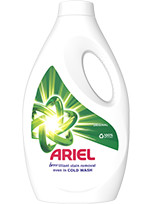We know how frustrating it is when you pull your whites out of the machine only to find a stray red sock had sneaked in with them and turned everything pink. Learning how to sort the laundry and what colours you can wash together this way is too harsh, so read on and follow our tips and tricks to say goodbye to laundry accidents.

Can you wash grey and white together? – How accidents happen
The usual sources of laundry accidents are the following:
Reactive dyes. These dyes aren’t always stable when they come into contact with detergents that contain bleach, so they may leak out onto other items in the wash. Detergents containing oxygen bleach also cause colours to fade
Bleed from direct dyes. Sometimes dyes can bleed out of one particular garment into the wash – even in cold/lukewarm water.
This is why it’s important to learn what colours can be washed together. Always wash your whites separately to avoid colour transfer. Light grey clothes, for example, are safe to wash with light colours, and you should put your dark grey garments in the dark pile.
Sorting laundry loads
It may be easy to throw a load of mixed laundry into the machine, but if you don’t want everything to turn an odd shade of pink or grey, it’s best to follow our tips to learn how to separate laundry and what colours you can wash together.
Sort your clothes and garments into groups: whites, light colours, dark colours and delicates (wools, silks, etc.). If you only have a small amount of one group, don’t be tempted to put it in with another – save it for a full load.
It’s very important to wash your lights and darks laundry separately, as darker dyes can ruin lighter fabrics. Sort your greys, blacks, navies, reds, dark purples and similar colours into one load, and your pinks, lavenders, light blues, light greens and yellows into another laundry.
Once you have sorted your laundry by colour, it’s time to sort them by fabric type: Never wash your delicates (items such as lingerie, pantyhose and washable silk), cottons and denims together as they all require different water temperatures.
Assigning clothes to separate piles based on their level of dirtiness is another wise strategy to follow if you want the best results. Heavily soiled items usually need to be pre-treated and need more agitation from the machine to be properly cleaned. Go through your heavily soiled clothes with a stain remover before loading them into your washing machine to prevent the redepositing of stains.
For dazzling whites - use all detergents containing bleach, such as Ariel Original Washing Powder.
Quick tip: Turning your clothes inside out will protect them during the wash. It stops jeans from turning white at the seams.
For colours -use a detergent without bleach, such as Ariel Colour All-in-1 PODS Washing Capsules, Ariel Colour Washing Liquid or Ariel Washing Gel Colour & Style.
Quick tip: Stains on coloured clothes is not an issue anymore. Try Ariel Original Washing Liquid that is tough on stains but gentle on your coloured garments.
Choosing the right laundry basket
With the help of a partitioned laundry basket or more than one laundry basket, sorting becomes easier. You can even label the sections what clothes go into what sections to make it simple for everyone in the family. You don’t have to have lots of these if you don’t want to, but lights and darks laundry baskets can already make your life so much easier.
In case someone places something in the wrong section, check labels for the manufacturer’s washing recommendations. If in doubt, test an item for colourfastness by applying warm water to an inconspicuous part (for instance, the inside of a hem), then press with a warm iron between two pieces of cloth. If any colour leaks, it’s not colourfast.
See all sources:
Related articles
Tips on how to ensure that your clothing lasts longer
How to fix a washing machine that has no water entering it
When your washing machine won’t fill with water, act! You can probably solve the problem yourself in most cases, with just some basic tools and a little time.
How to always measure the correct dosage for your wash
Ever seen white residues on your clothes after washing and thought... “I’ve used too much laundry detergent in that load!” Well, not necessarily!



